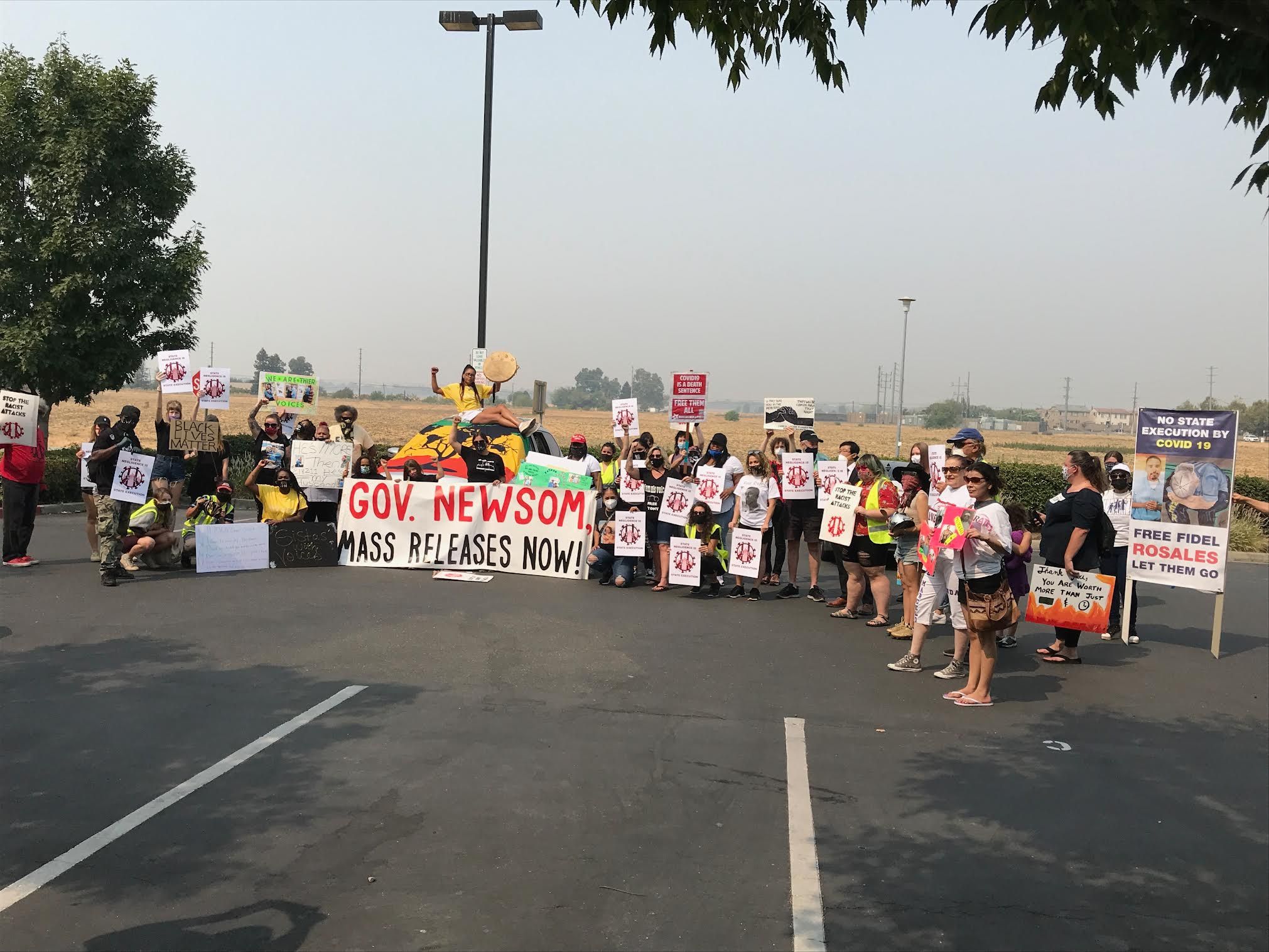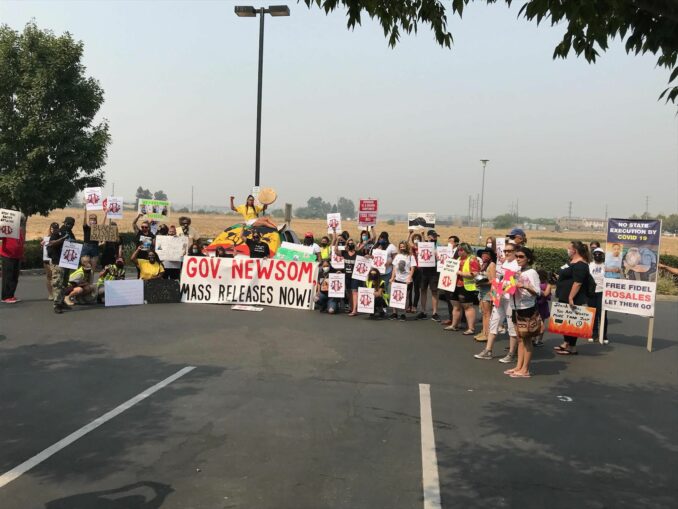

Family members and prisoners' rights activists gather in Sacramento to demand mass releases, August 30, 2020. Credit: No Justice Under Capitalism
By Steve Brooks
This article previously ran as an op-ed piece in the Sacramento Bee.
For six and a half hours, the Greyhound-size prison bus bounced precariously along a highway from Chino north toward San Quentin. Incarcerated men in orange jumpsuits were tightly packed inside, with metal restraints uncomfortably wrapped around their waists and ankles. Some of them were coughing; others were sneezing. None of them knew that they were about to experience the worst epidemiological disaster in prison history.


Family members and prisoners’ rights activists gather in Sacramento to demand mass releases, August 30, 2020. Credit: No Justice Under Capitalism
On this two-year anniversary of the worst outbreak in prison history, I can still hear the sounds of incarcerated people kicking on cell doors screaming, “Let us out!” I still see visions of people collapsing on the stairwells because they couldn’t breathe. I can hear the alarms buzzing, the shuffling of boots, the jingling of keys and stretchers hitting the floor, the sirens from ambulances carting off residents. And I still remember thinking to myself, “Am I going to die?”
Since COVID-19 first arrived at San Quentin State Prison, infecting more than 2,000 incarcerated people and killing 29, lawmakers and the courts appear to be less concerned about the dismal conditions at the prison. Many of them contend that the vaccines are a game changer, but prisoners are still existing in a perpetual state of sickness.
Today, San Quentin has once again become the epicenter for another COVID-19 variant — the BA.2 subvariant of omicron. It’s a highly transmissible virus easily fueled by overcrowding and poor ventilation. As of today, 93% of the incarcerated population at San Quentin is vaccinated; yet this is the second time this year an outbreak has occurred.
Many of us are learning that vaccines are not enough to protect us.
As the rate of COVID-19 outbreaks accelerates, they hinder our way of life inside, through canceled visits with loved ones, lockdowns and no access to programming. The law library is closed, and religious services and outdoor activities are severely limited. Despite this, incarcerated critical workers are forced to go to work — with the threat of dire consequences if they refuse.
Unvaccinated guards, incoming buses, overcrowding, poor ventilation, outbreaks and quarantines have all contributed to a general sense of unease. The San Quentin population now stands at almost 3,200, operating at over 100% capacity despite active COVID-19 outbreaks. More prisoners are transferred in from around the state every day.
There has been at least one COVID-19-related death of a prisoner at 33 of California’s 35 prisons. Yet the California Department of Corrections and Rehabilitation has not apologized for its failures, and Gov. Gavin Newsom neglects to issue urgent releases to protect the health and safety of those incarcerated.
We are seeing a defiant state of indifference, all while being caught up in a cyclical state of suspended animation in this COVID-19 matrix.
For those of us who still live here among the ruins and memories of the dead, this is our ground zero. Sometimes I wonder what it’s all worth — the heavy weight and constant quickening of my heartbeat triggered by sounds of screaming.
How long will lawmakers wait before they take action to address what’s going on inside our secret world? Will they wait until more of us are dead? We need lawmakers in power who are willing to take action to protect our lives, because COVID-19 isn’t going away.
What happened here at San Quentin — what continues to happen here, right now — is a violation of our humanity. When I see the prison buses roll in, full of incarcerated people dressed in orange, in each of our eyes is a vision of death. On this two-year anniversary of the worst outbreak in prison history, I can only say, “Here we go again.”
Steve Brooks is an award-winning incarcerated journalist who currently works at San Quentin News, a publication written and produced by the incarcerated.
Raposo is a Portuguese Marxist analyst, editor of the web magazine jornalmudardevida.net, where this article…
By Alireza Salehi The following commentary first appeared on the Iranian-based Press TV at tinyurl.com/53hdhskk.…
This is Part Two of a series based on a talk given at a national…
Educators for Palestine released the following news release on July 19, 2025. Washington, D.C. Educators…
On July 17, a court in France ordered the release of Georges Abdallah, a Lebanese…
The following are highlights from a speech given by Yemen’s Ansarallah Commander Sayyed Abdul-Malik Badr…